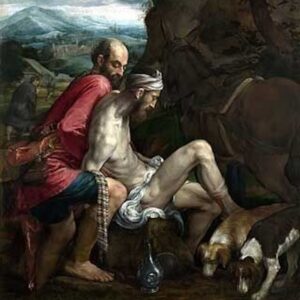We recently spoke with author Leslie Williams about her new Slant book of poems, Matters for You Alone.
The title of your new book is Matters for You Alone. How did you come to this title and what is its significance?
The title is from the phrase “you will be taught matters which are for you alone,” attributed to Jean-Pierre de Caussade, a French Jesuit priest who lived in the 1700s. He was a spiritual director to nuns among other things, and his writings have been collected and translated in the spiritual classic Abandonment to Divine Providence. I’ve always been interested in the one-on-one, intimate relationship each of us has to our maker, and how the lessons of this life are both incredibly particular and tied somehow to the holy cosmic framework. For me, poetry has a role in spiritual exploration and discernment. I think we read poems to touch the mysterious, and to engage with the very serious claims on our lives. And often I come to a poem to be instructed in some way, to be taught what I need to know in a moment or situation.
The word “matters” could be a noun or a verb. What matters to me might not matter to you. But I hope it does. What a world it would be if everyone could have this bespoke understanding of God’s voice and their own “createdness.” One poem in the book, “On the Sixth Day,” tries to get at this: “(each beast with unique rococo worlds inside) / you might call it a petite musique / you might know every daughter / has a different understanding of the father.” I find it very comforting that although we share a common humanity, we’re not generic beings. That each of us has a singular combination of gifts and flaws to contribute to the whole. Petite musique is a phrase I once heard for “inner life,” or the little original song each of us sings to ourselves, or maybe is sung to us. Teresa of Avila writes about “the interior castle” as the place we relate to the one who made us and seeks us always. I’d posit that“soul matters” are tailor-made for our own sensibilities and situations and are delivered in a kind of sacred privacy. A “secret information” if you will, or at times even a very specific in-joke that catches one by joyful surprise.
Some readers have asked: who is the you? I hope it’s not greedy to have “you” mean multiple things! First it speaks to the reader, the “you” who’s invited into the book. In some of the poems “You” addresses the Divine. And in other poems the “you” is addressed to the friend, a character in the book. Finally, “Matters for you Alone”: not only meant for a single person, but also for someone literally by himself: a solitary reader, or a person sitting in prayer who is expecting some kind of response. Sorry, that’s a lot of explaining for just four words!
The book uses a variety of pronouns and shifting voices. Who is the speaker here? And please say more about the “friend” character.
I was hoping for a kind of “composite” reading of the speaker(s) and the friend(s). And, that the particular details (a fawn-colored coat, a friend sobbing under the bridge near the sorry pizza place) could have universal resonance. Hasn’t everyone struggled with friendship, both having a friend and being one? It’s hard work at times, and there’s no map for it. And yet, friends are one of the great gifts in this life. It’s kind of mysterious, what binds or separates us. There are so many “simpatico, valorous, keen” people who travel the way with us. One of my early readers described “the friend” as a vessel for the Other, and also for the self/Self, and the book as kind of following an evolving epiphany the speaker is having about that concept. The friend is multifaceted—not terribly unlike the concept of the Trinity, in fact.
I’m also interested in how much early friendships shape us, as in Brenda Shaughnessy’s book Tanya. We can obsessively return to those formative relationships to try to see ourselves better in the present, looking back at the road that brought us here. I’ve always held these twin wispy phrases in my head: “Wherever you are it is your friends who make your world” (William James) and “Where do they go? / The people who sail into your life / like green leaves / and disappear like snow.” (Rod McKuen). From my earliest Childcraft encyclopedia, I’ve always remembered that simple little poem. Maybe that was a “matter for me alone,” I don’t know!
Say more about the “shape poems” in the collection, and the variety of forms you use.
At first I was kind of worried about the shape poems. I’m a huge fan of George Herbert and his object poems like “Easter Wings,” and “The Altar,” and I care a lot about how a poem looks on the page. How even a single word looks is as important to me as the sound(s) it makes. For example, a word containing “x” or “z” has its own crackle of visual energy in addition to its sound. I wanted to experiment with actual form beyond the conventions of formal poems, which I also love. For example, in “Quartzes Formed in Hidden Chambers,” I wanted to express that crackling at the center, the surprise when breaking open a plain rock to find stunning crystals inside. Kind of like a human person and her hard shell containing a vibrant inner life. I guess the whole book is kind of an argument for the secret hidden beauty of each of us: “a gem’s small blast of being” and how its “Deep Siberian purple glister” is only produced by pressure, by love’s “perilous extremes.”
In “Paper Lanterns Blowing in the Trees,” the lantern image was at the heart of the collection early on. It evokes for me a protected (inner) flame that can also be a beacon lit at night or in a storm to guide a weary traveler on her way. And the paper lantern in “Blurred Edge” stands in for a whole life: the co-existing fragility and fire. The soul’s blaze, contained in fallible, failing flesh. I wanted to make a poem that showed the lanterns, as little guidelights, suspended among trees. I think the “lantern” as a poetic form—with five lines and a precise syllable count—originated in Japan. I like the way they look blowing down the page, and the challenge of holding meaning in scarcity. I wanted to make a shape using words as the material, and to discover what words would be forced out of the shape. All this is hopefully in service to the main meaning(s) of the book, to look for and recognize the divine spark—the shekinah glory—in each other, even when circumstances are fraught.
How would you say your faith informs these poems?
I’m deeply aware of scripture, its immense beauty and indelible images and stories. It’s the Ur-text for me, a place I return for guidance and inspiration. It’s always new. And the sense of seeking the knowledge and love of God is always with me. I love the Prayer of Humble Access, how we are not worthy so much as to gather up the crumbs under the Lord’s table, and yet this is the same God whose character is always to have mercy. Poems seem like a good place to ask difficult theological questions, partly because they can dwell and operate with images and music, outside of logical argument. As Rabbi Heschel wrote: “Concepts are delicious snacks with which we try to alleviate our amazement.” I think of poems this way. I’m amazed by the magnificence of the natural world and by the communion of saints (and we are all saints, according to my tradition, anyway). And I think a poem can affirm the statement in a needlework sampler I once saw on an old Southern lady’s wall: “I know I’m somebody, cuz God don’t make no junk!” I guess in poems I’m always trying to mix the registers of high church and Biblical language with more folksy locutions, to bring it all together.
And, as in “Veil Torn in Two”: I think we’d like to approach the high holy places without being obliterated by the brightness of the Divine. Parables and images and sometimes words can get us close sometimes. As the speaker says in “Proved by the Sparrow,” “More and more I feel / threaded by the divine in life, and what a fine needle it is.”





